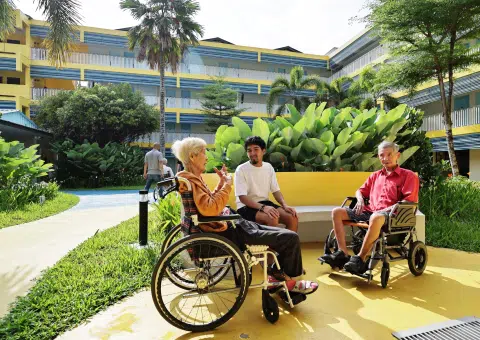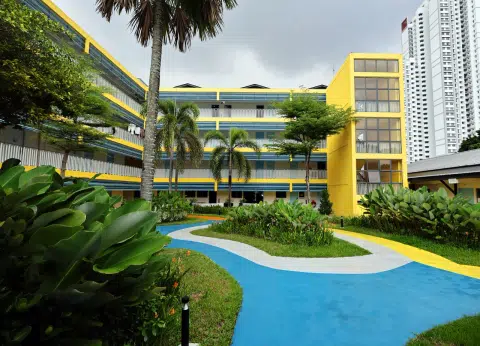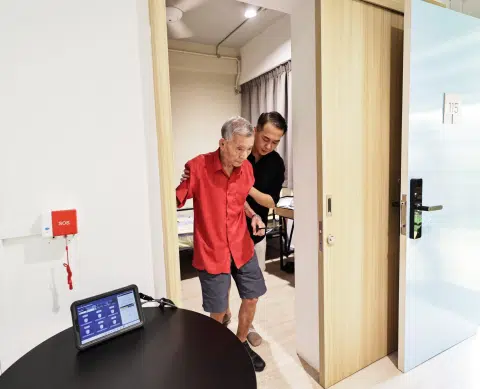'Growing old doesn't mean you cannot enjoy life': The Assembly Place CEO pitches seniors co-living with youth
Eugene Lim says intergenerational co-living - seniors living in dedicated homes or communities alongside younger people - can work.
Singapore's ageing population and limited land supply are fuelling demand for new housing options for seniors. Yet, many people here still fear the social stigma of putting their parents in eldercare homes, seeing it as going against deeply held family values.
But if Singapore can normalise the idea of seniors living in dedicated homes or communities, ageing gracefully could become much easier.
One promising approach is a mixed-age, co-living model, or what Mr Eugene Lim, chief executive of co-living operator The Assembly Place (TAP), describes as intergenerational co-living.
At the heart of this concept is the belief that seniors deserve to enjoy life in their later years, but happiness cannot come from being surrounded solely by their peers, as is the case for nursing homes, assisted living facilities and even retirement villages.
Instead, the key to a fulfilling home for seniors is for them to live alongside younger generations, creating a vibrant, positive community.
If successful, this new model of living could fill a significant gap in the eldercare market, Mr Lim told The Straits Times in an interview.
The way he sees it, intergenerational co-living could reshape perceptions about senior housing in Singapore.
By pairing seniors with younger residents, the model could show families that their parents are not being "put away" but are instead part of a vibrant, mixed-age community that supports active, dignified ageing.
"Singapore's ageing population is everyone's responsibility, myself included. If a co-living operator can take away the guilt that families feel about putting their parents in a home, I think we can solve this big issue in society," he said.
TAP - which provides accommodation that blends private rooms with shared common areas for people who prefer flexibility, community, convenience and affordability - has already started offering co-living spaces for intergenerational tenants.
At Commune on Henderson, a repurposed primary school site, 10 seniors now live together with around 100 students aged 18 to 25 under one of the first such living arrangements in Singapore.
"When senior citizens come into our space, I want them to feel good. And naturally when they see young people around them, they feel young as well," Mr Lim said.
"At the same time, we want their children, the original caregivers, to feel happy about sending them here because it is no longer taboo to do so."
The residential facility has all the amenities and personnel required for eldercare, including a 24/7 station staffed by a roster of eight full-time nurse aides, in a partnership with Crawfurd Silver Care - the geriatric care arm of private hospital Crawfurd.
What distinguishes Commune from other purpose-built eldercare homes is its primary objective of promoting active ageing by living in a diverse community.
Seniors who live there do not require the full-fledged services of a nursing home, and tend to prefer an independent living environment that is supported by lifestyle amenities and basic healthcare services.
At Commune, residents are more than just neighbours - an important part of its culture.
With the help of the property's facilitators, who organise regular social mixers, young people and seniors are encouraged to mingle with one another instead of staying within their own circles for the duration of their stay.
For example, a 69-year-old resident who used to be a bank executive was asked to share her banking experience with four student residents who are reading banking, finance and business management.
Mr Lim hopes that this enriching and fulfilling aspect of his co-living model will attract more senior residents and carve out a new niche in the co-living and eldercare space.
He compared his concept with a workplace where younger and older employees can learn from working with one another, creating a healthy atmosphere in the office.
He hopes to bring about a mindset shift - seniors wanting to move into such homes, and their children feeling at ease with the arrangement.
"No one feels good about putting their parents in a home, and in most cases, it is the last resort," said Mr Lim.

Often, families struggle to juggle looking after both young children and elderly parents, and may be reluctant to hire a domestic helper based on their own or other people's negative experience.
Also, some seniors may not want to be a burden on their adult children and prefer to live on their own despite their children's misgivings.
This emotional aspect is what Mr Lim aims to address.
Mr Lim, who is 42 and married with one son, cited his experience with his parents as inspiration for the intergenerational living concept.
His parents, who are approaching their 70s, chose not to live with him as they are still relatively healthy and do not want to impose on his family. Instead, they visit Mr Lim's home twice a week for dinner.
"Growing old doesn't mean you cannot enjoy life. You should still be able to enjoy a steak, a cigar. But if one day, my dad needs some form of care, I would never even dare to have the idea of sending him to a nursing home," Mr Lim said.
He added: "So my intergenerational living space needs to be the most hip place for seniors that both they and their children are excited to share about. I want them to feel like they are the cool kids in town.
"When my boy becomes an adult, I will tell him the same thing - that he can move out (of the family home) because I don't need to burden him.
"Meanwhile, I will move into an intergenerational co-living space because I want to be with young people and it makes me happy."

Taking the message to society becomes crucial to making this vision a success, Mr Lim noted.
Commune, by creating a meaningful community comprising students and seniors, has garnered interest from tertiary institutions, which want to partner with the co-living space for student accommodation and corporate social responsibility programmes, he said.
"From the schools' point of view, we offer their students who stay with us a wholesome and holistic environment because they are engaged in meaningful activities by interacting with the seniors on a regular basis," Mr Lim said.
"This also gives students' parents the confidence to trust us with looking after their children."
Commune, a joint venture with foreign worker dormitory operator TS Group, opened in June, with renovations costing around $5.5 million.
This is the second joint venture between the two companies. They have launched three hostels for foreign healthcare workers since 2024 under a contract awarded by Ministry of Health Holdings (MOHH).
Mr Lim noted that the repurposing of the school for its current use was not difficult with the help of partners.
The "software" aspect of building a community for both the young and the old is the bigger challenge.
"Anybody can build the infrastructure for an eldercare facility. We are not in the business of simply building or managing a property, but building a community-driven life that takes away loneliness and creates happiness," he said.
"Our mandate at TAP has always been every asset of ours needs to have a purpose."
Social programmes are a hallmark of TAP's portfolio, catering to different age groups - from students to young expat professionals.
The activities include sports competitions, cooking and knowledge-sharing events.
The company manages some 4,000 rooms at more than 145 locations.

While the Commune experiment is still in its infancy, Mr Lim has a bigger ambition for his intergenerational co-living model - a fully integrated nursing home.
He has already set a target for the number of residents living at Commune to increase to 40 seniors and 200 students by 2026.
While he stressed that he has no plans to move into the nursing home space now, he acknowledged it would be a natural evolution as the concept takes hold in the next decade.
As the senior residents age, they will require more dedicated medical care, and Mr Lim hopes to meet their needs if they do not wish to move to a nursing home - especially when they already feel comfortable living at Commune.
Future mixed-age co-living spaces will benefit from TAP's experience with Commune, as well as in managing two purpose-built student accommodation properties, he said.
"I can place nursing students and seniors in the same property, working with a non-governmental organisation or healthcare provider to offer on-site training for these future healthcare workers."
He added: "I don't know when this will happen, maybe in five years' time or even earlier. That is why we need to start working on solving the ageing population issue now and breaking down barriers by building a purposeful and intentional community."
What is certain is Singapore's ageing population issue will only get more serious in the near future.
According to the Ministry of Health, one in four Singaporeans will be aged 65 or older by 2030.
As at June 2025, about one in five Singaporeans is 65 or older, according to the annual Population in Brief report released by the Prime Minister's Office on Sept 29.
The number of Singaporeans aged at least 80 shot up by about 60 per cent in the past decade to about 4 per cent of Singapore's population, up from 2.7 per cent a decade ago.
Housing models catering to elderly residents who prefer to live at home and not a dedicated eldercare facility will play an increasingly important role in the Government's strategy to support active ageing. This was a point that Prime Minister Lawrence Wong also raised in his National Day Rally speech on Aug 17.
But with increasing land scarcity driving up real estate prices, TAP could find it a challenge to scale up its intergenerational co-living business.
"We need to have economies of scale to bring our costs down so that we can continue to offer affordable accommodation to expand the intergenerational co-living concept.
"It will be very sad if we have the proof of concept, but potential residents say they cannot afford our rooms," Mr Lim said.
"We may not be the sexiest asset, but our priority is on building the programming and strengthening the community on our properties."
Benjamin Lim for The Straits Times